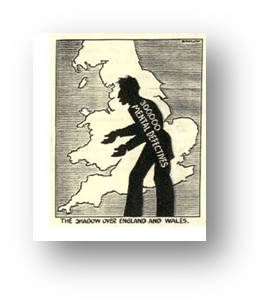The Public Face of Mental Illness
Specialist symposium on the History of Psychiatry
3 November 2001
Organisers: Vicky Long, Hilary Marland and Mathew Thomson
The symposium embraced the issue of the representation of the mentally ill and the public. Taking the late nineteenth- to the late twentieth-century, the topics covered the period typified by fear about the rising numbers of the insane, degenerationalist concerns, the pessimism of late nineteenth-century asylums, through to the controversial somatic therapies of the early twentieth-century, and de-institutionalization and 'care in the community'. It focused on the problems of researching and problematising the category 'public', and contrasted the public face with private views of mental disorder. The symposium provided the opportunity to explore a range of sources, and brought together established and younger researchers.
The papers in the morning session examined the implications of the nineteenth-century Irish Dangerous Lunatics legislation (Catherine Cox), Christian Watt's published account of her hospitalization compared with hospital case notes and other hospital records (Allan Beveridge), allegations of violence by mental nurses and former patients reported in journals in 1920 (Vicky Long), and Dr Helen Boyle's work in the early twentieth century with uncertified cases of mental disorder (Louise Westwood).
Papers in the first session of the afternoon considered the popularity of psychoanalysis in the 1920s (Graham Richards), how questions of risk affected community treatment of the mentally ill in the 1930s and 1940s (Pamela Dale), public perceptions of mental illness in the shift to community care (Pamela Michael), and MIND's switch in focus from mental hygiene to the legal rights of the mentally ill (Jonathan Toms). In the final session of the day, the speakers examined the role of moral panics regarding the incarceration and decarceration of the mentally ill (Francis Neary) and how beliefs about the mentally ill evolved over the twentieth century from ideas of degeneration to the risk posed by dangerous people to society (Peter Bartlett and Ezra Hasson).


